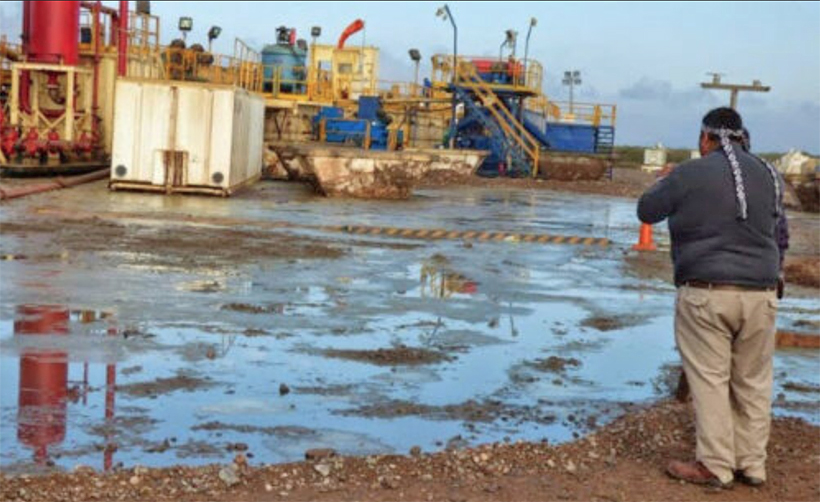At the end of 2000, the Argentinean Association of Environmental Lawyers warned of the phenomenal levels of pollution in Vaca Muerta. The lawsuit was filed against Comarsa, the company in charge of treating the waste, along with eight oil companies and the authorities of the Neuquén government.
By Ricardo Serruya
The association filed a criminal complaint in the courts of Neuquén. A video posted on social networks by one of its members, Dr Rafael Colombo, presented what he said was “the flip side of an exploitation that reveals a detailed plot involving the usurpation and contamination of public lands, liberated zones and the simulation of oil waste treatment”.
At the time and in dialogue with this journalist, Colombo clarified that the contamination is massive because the drilling of wells has resulted in the scandalous and dangerous accumulation of waste in supposed treatment plants located in the urban areas of the cities of Añelo and Neuquén, which only function as dumps and are not treated, creating an environmental liability that affects the environment and the health of residents and workers who live with contaminated mud, hydrocarbons, sewage and chemical waste.
The responsibility of the state of Neuquén is two fold, not only because of its lack of control but also because, in the case of Añelo, this anomalous situation occurs on public land.
Three years later, in 2023, the site was visited by the International Court of Nature Rights. Not only had nothing been done, but the situation had worsened and was denounced in this video.
It is almost 50 hectares of public land (the equivalent of 50 football fields) that the government of Neuquén ceded to the company Comarsa, which today suffers from a phenomenal level of pollution. The private state-owned companies YPF, Pan American Energy, Shell, Tecpetrol, Pampa Energía and Chevron, among others, which exploit the Vaca Muerta oil fields, are partly responsible for this situation and have contracted Comarsa, which receives millions of pesos to carry out treatments that are not being carried out.
The complaint has been going on for almost 4 years and it is impossible to quantify the damage caused. But if we go back to 2020, it was estimated that 300,000 cubic metres of drill cuttings and more than 400 cubic metres of toxic material were dumped on the site.
Today, the situation has become scandalously worse.
The full denunciation by the Association of Environmental Lawyers shows that both plants treat so-called “drill cuttings”, also known as “cuttings”, a mixture of mud and hazardous chemical waste, which is not treated not only because of a lack of expertise and negligence but also because the company has never made the necessary investments to provide thermal treatment furnaces, which are indispensable for this type of waste treatment. The result is the permanent accumulation of waste in improvised, unlined pits that mix with the soil, as this visual document shows.
The anomalies are many and varied.
Here are just a few of them:
Between 2016 and 2018, the company Comarsa dug new pits – without closing the existing ones that had already reached the end of their useful life – without respecting the technical indications. This increased the amount of untreated waste.
Similarly, in 2018, the Neuquén government authorised Comarsa to treat oil waste using a technique known as “bioremediation”, which is not possible due to the climatic conditions in Neuquén.
In the town of Añelo, untreated drill cuttings were stockpiled for two years.
The provincial legislation of Neuquén stipulates that these treatment plants must be located at least 8 km from the communities. Neither the city of Neuquén nor Añelo meet this requirement.
In 2019, the province of Neuquén, in an irresponsible, unconstitutional, and illegal manner, authorises Comarsa to bury hazardous waste without any treatment.
It takes time, but in the end, there is no end to the reward.
So goes the song ‘Zona de promesas’ by the band Soda Stéreo, and it can be adapted to fit the situation.
A few days ago, after a long struggle, and as part of the criminal investigation promoted by the Association of Environmental Lawyers, the Court of Revision unanimously ratified the precautionary measures against the directors of the Comarsa company. In this way, the Court has confirmed the embargoes of up to 7 million dollars on the company’s assets, as well as a preventive embargo on assets such as the 4 sheds and 3 pyrolysis ovens located in one of the company’s factories.
In her ruling, Judge Carolina García read out the Collegiate Court’s decision, which highlights the need to “put an end to the fraudulent maneuvers under investigation” and to prevent the “environmental liabilities generated” from getting worse. “No one can guarantee that the effects of environmental damage will not be felt for many years to come, that they will not affect our health and the rights of present and future generations,” the court’s ruling states with certainty.










